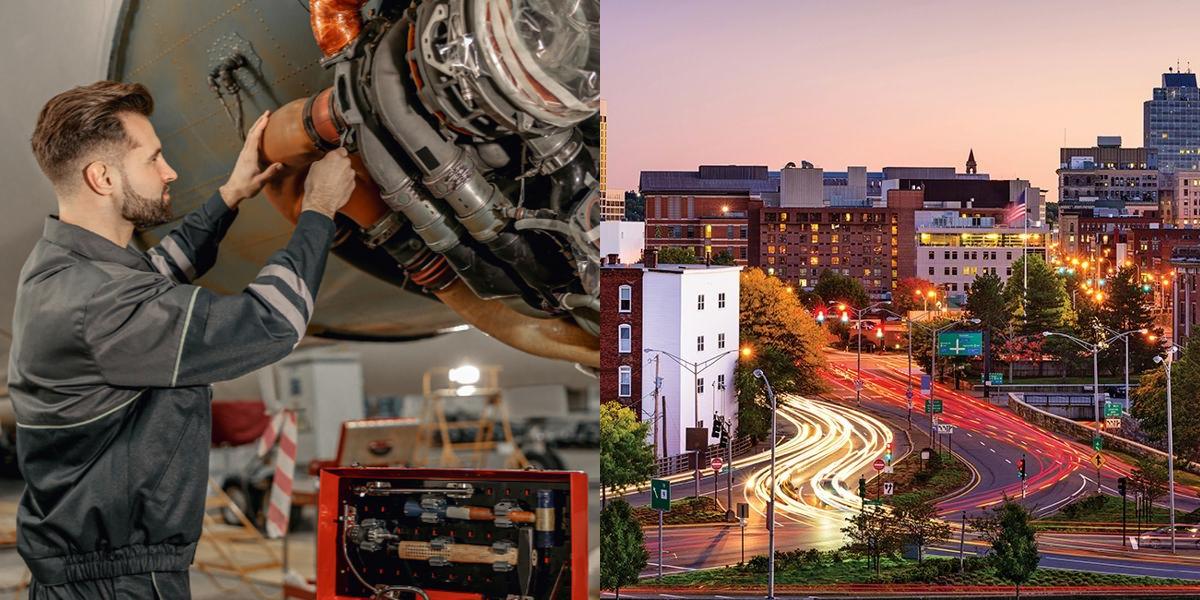How to Become an Aviation Mechanic in Massachusetts

Aviation mechanics play a crucial role in ensuring the safety and proper functioning of aircraft. They are responsible for inspecting, repairing, and maintaining aircraft to ensure that they meet all safety regulations and standards. Here's all you need to know about becoming an aviation mechanic in Massachusetts.
Step 3: Apply to Aviation Maintenance Companies
Research aviation maintenance companies in your area and apply for job openings. These companies may include airlines, aircraft manufacturers, repair stations, or private aviation companies. Check their websites, job boards, and industry-specific websites for job postings. Tailor your application materials to each company, highlighting how your skills and experience align with their specific needs.
Step 4: Consider Apprenticeships or Internships
If you are having trouble finding a job as an aviation mechanic, consider applying for apprenticeships or internships. These opportunities can provide valuable hands-on experience and may lead to full-time employment. Reach out to local aviation maintenance companies or contact your certification school for potential apprenticeship or internship opportunities.
Step 5: Prepare for Interviews
Once you start getting interview opportunities, it's important to prepare thoroughly. Research the company and the position you are interviewing for, and come up with thoughtful questions to ask the interviewer. Be prepared to discuss your experience, problem-solving skills, and your ability to work in a team. Dress professionally and bring copies of your resume and any other relevant documents. Practice common interview questions and be ready to provide specific examples of your skills and experience.
Step 6: Continue Learning and Growing
The aviation industry is constantly evolving, and it's essential to stay up-to-date with the latest advancements and technologies. Consider taking additional courses or certifications to expand your knowledge and skills. Stay connected with professional organizations and attend industry conferences or workshops to network and learn from other aviation professionals.
Career Paths and Opportunities after Becoming an Aviation Mechanic
Becoming a certified aviation mechanic opens up a wide range of career paths and opportunities within the aviation industry. Here are some potential career paths you can explore:
Airline Maintenance Technician
Many aviation mechanics find employment with commercial airlines. As an airline maintenance technician, you would be responsible for inspecting, troubleshooting, and repairing aircrafts to ensure they are safe and in compliance with FAA regulations. You may work in hangars or on the tarmac, performing routine maintenance checks, diagnosing mechanical issues, and performing repairs as needed.
General Aviation Mechanic
General aviation mechanics typically work with smaller aircraft, such as private planes or helicopters. They may be employed by private aviation companies, flight schools, or individual aircraft owners. General aviation mechanics perform a wide range of tasks, including inspections, repairs, and modifications. They may also provide maintenance services for aircraft during routine annual inspections.
Aviation Maintenance Instructor
If you have a passion for teaching and sharing your knowledge, a career as an aviation maintenance instructor may be a good fit. Aviation maintenance instructors work at FAA-approved aviation maintenance technician schools, teaching students the skills and knowledge required to become certified aviation mechanics. This role requires strong communication and instructional skills, as well as a deep understanding of aircraft maintenance procedures.
Aircraft Manufacturing Technician
Another career path for certified aviation mechanics is to work in aircraft manufacturing. Aircraft manufacturers employ mechanics to assemble and install various components of the aircraft during the manufacturing process. This role may involve working with advanced technologies and specialized equipment.
Opportunities in Massachusetts
Massachusetts, with its thriving aviation industry, offers numerous opportunities for aviation mechanics. The state is home to several major airports, aviation maintenance companies, and aircraft manufacturers. The prominent aviation industry in Massachusetts provides a range of job opportunities for certified aviation mechanics, from working with commercial airlines to being a part of cutting-edge research and development in the field of aviation technology.
Some major aviation companies in Massachusetts include:
- General Electric Aviation: GE Aviation is a leading aircraft engine manufacturer and maintenance provider. They have a facility in Lynn, Massachusetts, which offers job opportunities for aviation mechanics.
- JetBlue Airways: JetBlue Airways operates at Boston Logan International Airport and provides job opportunities for aviation mechanics. They offer a range of positions, from line maintenance technicians to overhaul mechanics.
- Raytheon Technologies: Raytheon Technologies is a major aerospace and defense company with a facility in Massachusetts. They offer various positions for aviation mechanics, including aircraft maintenance technicians and assembly mechanics.
Final Thoughts
Becoming a certified aviation mechanic is a rewarding career choice for those who have a passion for aviation and a desire to work with their hands. By following the FAA's certification process, gaining practical experience, and continuously learning and growing, you can establish yourself as a skilled and sought-after aviation mechanic. Whether you choose to work for an airline, in general aviation, or pursue other opportunities within the industry, the possibilities are endless. So, start your journey towards becoming an aviation mechanic and enjoy a fulfilling and exciting career in the world of aviation.
Wondering if there's more? Perhaps these other articles will be more helpful if this one isn't exactly what you're after:

Jessa Guzon is a member of the School Growth and Customer Success Team in Dreambound. She finds joy in assisting both schools and students in reaching their goals by answering their queries and connecting them with the right people. Outside her professional role, Jessa is a happy-go-lucky person with a thirst for adventure.



